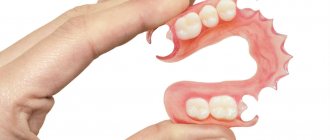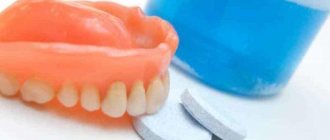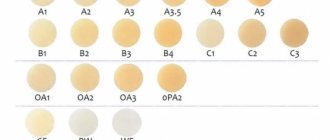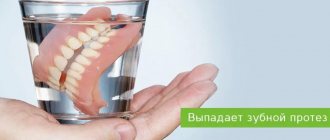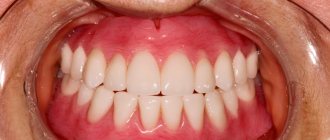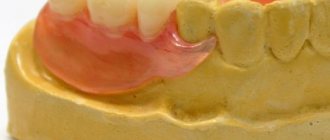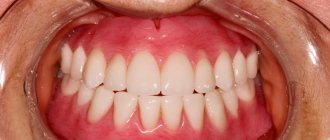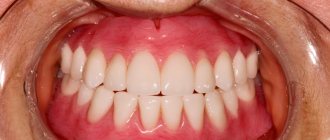- Peculiarities
- Kinds
- Lamellar
- Sandwich dentures
- Quadrotti
- Clasp
- Fixed
- Prosthetics or implantation?
- Manufacturing
- Prices
- Work examples
- Doctors
- Reviews
An upper denture is used in cases of partial absence of teeth or complete edentia in the upper jaw. This method of restoration in Moscow RUTT dentistry will return the patient’s smile and self-confidence in a difficult situation for him. Together with a clinic specialist, you can choose the type of structure and material for prosthetics of the upper teeth that is suitable for the price.
- When used:
complete or partial absence of teeth in the upper jaw - Type of anesthesia:
local anesthesia - Installation time:
from 1 day - Materials:
metal, ceramics, zirconium dioxide, acrylic, nylon, etc. - Features:
step-by-step treatment possible - Age restrictions:
18 years and older
Why is it important to get dentures when missing teeth?
Every qualified dentist will tell you that you can’t walk around for long with missing teeth. Prosthetics of the upper jaw, as well as the lower one, must be carried out in a timely manner. Let’s highlight some points on what this affects:
- the first thing is aesthetics when smiling and talking. But this is a purely individual question. Some people are willing to put up with it;
- change in facial features - the upper lip looks strange, in the absence of front teeth, and in the absence of lateral teeth, the cheeks sag, nasolabial wrinkles become wrinkled;
- speech defects appear;
- there is no necessary load on the jaw, which leads to a poor supply of nutrients in this area. Bone is a living matter; if there is insufficient or no load, it can atrophy - the volume will begin to decrease, the density will change. For example, an implant cannot be inserted into such a bone without prior osteoplasty (bone augmentation surgery);
- neighboring teeth shift towards the voids, gaps appear, the rows become curvature, and the bite changes. And, if a person later decides to have prosthetic teeth in the upper jaw, he will first have to work with an orthopedic dentist to return the shifted teeth to their place.
Tooth displacement
Pak Roman Vladimirovich Dentist-orthopedist, doctor of the highest category
Is it possible to install a bridge that will restore 3 teeth in the upper jaw? What material?
Restoring such “extended” areas is a controversial issue; in many cases, implantation is more preferable. Only a doctor can answer the question more accurately after a visual examination and the necessary diagnostics.
Pak Roman Vladimirovich Dentist-orthopedist, doctor of the highest category
I want to restore the chewing teeth of the upper jaw with the help of a bridge. Which option is the cheapest?
The most affordable option for prosthetics of chewing teeth is cobalt-chrome with gold plating.
Crowns and bridges
The crown completely covers the tooth and allows you not only to reliably strengthen it, but also to change the shape, color and size, which is especially important for aesthetic defects.
Bridges It can also be installed on an implant or be part of a bridge.
The materials used for manufacturing are gold, metal alloys, plastic, ceramics, porcelain, zirconium. Metal crowns are more durable, but less aesthetically pleasing, so they are often installed on the side areas. Ceramic, porcelain and zirconium are highly aesthetic. This is important to consider when prosthetizing the anterior sections of the upper jaw .
Bridge structures are used to restore one or more missing teeth and, based on neighboring ones, fill the resulting space. Implants can also serve as support. Advantages: high aesthetics, strength and durability of structures, ease of care, no displacement when chewing or talking, the ability to completely change the appearance of teeth in particular and smiles in general, as well as their restoration in case of significant destruction of the coronal part. The dentist will help you make the right choice based on the situation in the oral cavity, aesthetics and cost acceptable to the patient.
Types of dentures for the upper jaw
The upper denture can be of the following type:
- removable
- the patient can remove it, remove it and put it back; - non-removable
- prosthesis fixed on dental implants; - conditionally removable
- removal only in the dentist’s office using special tools.
The doctor may suggest making the upper denture removable.
in case of complete loss of teeth or in the presence of one or more remaining ones. Let's look at the types of removable dentures for the upper teeth. We will dwell on some things in detail, and mention others briefly.
Lamellar dentures
A budget option for upper teeth prosthetics, the price is also not high, as is the convenience. The so-called “false jaws”, which are removed at night. The prosthesis is a plate simulating the sky with teeth. Attached with suction cups. Feature: installation with complete edentia.
Complete removable acrylic denture in a smile
Pros:
- low price;
- fast production and installation;
- load distribution evenly.
Minuses:
- the first days, nausea and a gag reflex are possible from the plate covering the palate;
- violation of diction;
- difficult care;
- injury to soft tissues, their rubbing;
- acrylic can cause allergies;
- insufficient fixation, it is necessary to use special ointments and gels.
Removable types of dentures for the upper jaw differ in material, they can be:
- acrylic
_ Inexpensive option, but may cause allergies; - acry-free
. Hypoallergenic material - improved acrylic plastic, fastenings (clasps) are made of the same material - invisible; - nylon
_ Soft, comfortable, aesthetically pleasing, their peculiarity and big disadvantage is that they stretch, quickly become unusable and cause pain when chewing.
A type of removable denture can be called a butterfly denture, which is installed in the absence of 1-2 teeth. Attached to adjacent teeth using petals. Many dentists consider it a temporary measure.
Sandwich prosthesis
A prosthesis is used when there are several supporting teeth that do not need to be ground. Removable design without palate, without arches or plates, which allows you to wear it comfortably without irritating soft tissues. Hard acrylic plastic and flexible polyurethane. Fasteners - telescopic crowns.
Quadrotti prostheses
Made from modern material that does not cause allergies, soft and comfortable plastic. They look natural in the mouth. Perfectly suitable as a prosthesis for the upper front teeth. Aesthetic. There is no overlap across the palate, which is very convenient for the patient.
For partially removable
prosthesis of the upper teeth requires the presence of one or more teeth acting as support. In addition, these must be strong and strong elements, because the upper denture will be attached to them.
Clasp dentures
On a reinforced metal frame there is a pink nylon or acrylic base under the gum with artificial teeth. When replacing the upper jaw with prosthetics, a thin metal arch runs across the palate (there are models without it). The structure is attached to the supporting teeth in two ways:
- with the help of clasps
covering the supporting teeth. When you smile, you can see them; - using attachment
locks. Some stand on the base, while others directly on the crown. Such fastenings are completely invisible; - telescopic crowns
are rarely used. The supporting teeth are prepared (sometimes not), and crowns with a prosthesis are attached to them. Those. they are both crowns and attachment points.
Pros:
- reliable fixation;
- does not block the palate - much more comfortable than an acrylic prosthesis with a full imitation of the palate;
- increased strength.
Minuses:
- not suitable for completely edentulous patients; support teeth are needed;
- metallic taste and changes in the taste of food;
- They are not placed in the absence of distant, outer teeth.
Pros and cons of partial dentures
Partial dentures have a number of pros and cons. This is an ideal option for temporary prosthetics. However, if implantation is possible, you definitely do not need a removable denture. In any case, it doesn't hurt to know which partial dentures are best. Elastic (but not too soft) designs made from hypoallergenic materials are considered to be of the highest quality. In case of partial absence of teeth, removable laminar dentures made of nylon and acrylic-free plastic are the optimal solution.
- Low price.
- Acceptable functionality and aesthetics.
- Fast production.
- Easy hygiene.
- They do not load the bone, which is why the bone tissue decreases.
- Fragility and fragility (the circuit prosthesis lasts a maximum of 5 years).
- Difficulty getting used to it.
Fixed dentures for upper teeth
Sometimes in dentistry they are called conditionally removable. This is a complete All-on-4 (all on four) or All-on-6 (all on six) dentures in the absence of all teeth. Where the structure is supported by 4 or 6 implants, respectively. All-on-6 is considered more reliable, since the load is distributed over 6 support points. Fixation is somewhat similar to clasp with a locking fastening, only instead of crowns they cling to the supragingival part of the implants. The microlock is of beam type and push-button type.
Example of ROOTT implantation in the before-after photo
With complete edentia and bone atrophy, prosthetics of the upper teeth on implants may be the only way out.
Indications for removable prosthetics
Removable dentures are installed when:
- the absence of several teeth in the dentition and the impossibility of fixed prosthetics;
- the patient’s refusal of fixed prosthetics;
- complete loss of teeth - adentia;
- loss of a large number of teeth (immediate denture);
- loss of one tooth (aesthetic prosthesis);
- for infectious-inflammatory and degenerative-dystrophic diseases of periodontal tissues (periodontitis or periodontal disease);
- severe general diseases that are contraindications for fixed prosthetics;
- individual intolerance to metal structures.
Removable dentures will be an ideal option if you lose several lateral teeth in a row on both sides or if you lose central teeth while keeping the lateral ones. This type of prosthetics is also very suitable for edentulous patients, if the patient refuses implantation.
Manufacturing of removable dentures
The main steps in the manufacture of upper removable dentures are as follows. They may vary slightly depending on the type and material chosen, but we will consider the removable option:
- an impression is taken, on the basis of which a wax model of the jaw is made;
- a plaster prosthesis is cast in the articulator;
- fitting takes place in the patient’s mouth;
- in the laboratory, the technician makes the final version - a metal frame with bases and crowns made of the selected material and color;
- fitting, fitting in the office, fixation. On average, the work takes up to 2 weeks.
Article Expert
Pak Roman Vladimirovich Dentist-orthopedist, doctor of the highest category
Work experience: more than 30 years
Which is better to choose?
Sergey Sergeevich Chepikov, a dentist at the 32 Dent clinic, recommends: “First of all, it is important to choose the right dental clinic where prosthetics will be performed. You definitely need to pay attention to whether the clinic has its own dental laboratory. Close interaction between the doctor and the dental technician ensures high accuracy and comfort of the finished prosthesis; moreover, production in one’s laboratory will be faster and cheaper for the patient. If a clinic does not have a laboratory, it is forced to transfer orders for the manufacture of structures to third-party institutions, which increases the cost of the prosthesis, increases the time for its production and can negatively affect the quality.”
When choosing a removable denture, you should focus primarily on the condition of the oral cavity (partial or complete absence of teeth, the condition of the gums), and you also need to take into account which jaw it is intended to be installed on. For partial edentia, the best solution would be a clasp; for complete edentia, a removable structure on implants.
The material of manufacture is also important: nylon is more aesthetically pleasing, flexible, comfortable, less traumatic for the gums, but acrylic is better able to cope with chewing food. In any case, it is better to make the choice together with the dentist, who is better versed in the clinical situation in the patient’s mouth and the features of a particular design.
At the 32 Dent clinic, patients will always be offered the best option for prosthetics at an affordable price and with the most accurate and high-quality installation of removable dentures. Our own laboratory, the latest equipment, high-quality materials, experienced dental technicians and competent doctors are the key to successful dental restoration for each patient. In addition, 32 Dent offers the best price for removable dentures in Moscow, while their quality remains at the highest level.
“32 Dent” provides its patients with a 1-year warranty on removable dentures. In general, the service life of structures with proper care is quite long - up to 10 years.
Advantages of the RUTT clinic and cost
At ROOTT clinics in Moscow, located at Butyrskaya and Proletarskaya metro stations, you will receive:
- full objective consultation on prosthetic methods;
- guarantee for all types of dentures for the upper jaw installed by us;
- comfortable restoration of chewing or frontal rows.
The cost of restoration depends on the specific clinical case: the number of missing teeth, the chosen design, material and work of specialists. You can find out more about the cost of an upper jaw denture by phone or at a free consultation with a specialist.
Prices
Free online consultation with a dentist
| Service | Price |
| Installation of a temporary cosmetic plate (butterfly) | from 11,000 rub. |
| Installation of a complete or partially removable lamellar denture (acrylic, 1 jaw) | from 32,000 rub. |
| Installation of a partially removable nylon prosthesis (1 jaw) | from 40,000 rub. |
| Installation of a clasp denture with clasps (1 jaw) | from 40,000 rub. |
| Installation of a complete removable denture Akri Free (1 jaw) | from 47,000 rub. |
| Installation of a one-stage multi-unit implant with screw fixation (Switzerland, Trate AG) with an adaptation crown | from 50,000 rub. |
| Installation of a splinting clasp prosthesis (1 jaw) | from 55,000 rub. |
| Installation of a partially removable clasp prosthesis Quadrotti (1 jaw) | from 64,500 rub. |
| Installation of a locking clasp prosthesis (1 jaw) | from 70,000 rub. |
| Installation of a clasp denture on telescopic crowns (1 jaw) | from 75,000 rub. |
| Conditionally removable acrylic prosthesis on spherical attachments Rhein-83 for 1 jaw | from 121,000 rub. |
| Installation of a complete metal-plastic bridge prosthesis on one-stage implants of the ROOTT system (alloy Germany, plastic Japan - 1 jaw), cement fixation | from 130,000 rub. |
| Installation of a complete metal-plastic bridge prosthesis on one-stage implants of the ROOTT multi-unit system with screw fixation (Germany alloy, on a metal frame, Japan plastic - 1 jaw) | from 155,000 rub. |
| Installation of a complete metal-plastic bridge prosthesis on one-stage implants of the ROOTT multi-unit system with screw fixation (Germany alloy, on a titanium frame, Japan plastic - 1 jaw) | from 175,000 rub. |
| Installation of a full bridge ceramic-composite prosthesis on one-stage implants (Germany alloy, on a metal frame, Japan composite - 1 jaw) with cement fixation | from 230,000 rub. |
| Installation of a complete metal-ceramic bridge prosthesis on one-stage implants of the ROOTT system on a metal frame, 1 jaw, cemented fixation | from 210,000 rub. from 250,000 rub. promotion |
| Installation of a full bridge ceramic-composite prosthesis on one-stage implants (Germany alloy, on a titanium frame, Japan composite - 1 jaw) with cement fixation | from 250,000 rub. |
| Installation of a complete metal-ceramic bridge prosthesis on one-stage implants of the ROOTT multi-unit system with screw fixation, 1 jaw, metal frame | from 230,000 rub. from 270,000 rub. promotion |
| Installation of a complete bridge made of zirconium dioxide on one-stage implants of the ROOTT system, 1 jaw, cemented fixation | from 320,000 rub. |
| Installation of a complete PREMIUM ceramic-composite bridge prosthesis on one-stage implants of the ROOTT multi-unit system with screw fixation on a titanium frame CONDYLAR - stage II | from 320,000 rub. |
| Installation of a complete bridge made of zirconium dioxide on one-stage implants of the ROOTT multi-unit system with screw fixation, 1 jaw | from 370,000 rub. |
| Installation of a full bridge ceramic-composite prosthesis on one-stage implants of the ROOTT system on a reinforced titanium milling frame with a stump for each tooth of increased aesthetics on cement fixation, 1 jaw, stage II (SHOFU ceramic composite, Japan) | from 400,000 rub. |
| Installation of a full bridge ceramic-composite prosthesis on one-stage implants of the ROOTT system on a reinforced titanium milling frame with a stump for each tooth of increased aesthetics on a screw fixation, 1 jaw, stage II (SHOFU ceramic composite, Japan) | from 420,000 rub. |
| Installation of a full ceramic bridge on one-stage implants of the ROOTT multi-unit system with screw fixation with individual IMAX crowns on a reinforced PREMIUM titanium milling frame, 1 jaw, stage II | from 480,000 rub. |
Consultation and diagnostics are free!
All prices Promotions
Sign up for a consultation
three ROOTT specialists + diagnostics as a gift
Indications and contraindications
Any medical procedure has contraindications and indications for its implementation. Installation of clasp dentures is no exception.
When experts recommend clasp
Installation of clasp dentures is indicated for patients with the absence of three or more teeth. In this case, there must be supporting parts for which the structure will be fixed. They use healthy teeth or artificial crowns. Most often, the installation of clasp dentures is recommended when it is not possible to install permanent structures.
Contraindications for prosthetics
Clasp dentures cannot be installed in patients with complete loss of teeth, since support is required for fixation. Fastening is also impossible with small crown sizes.
Removable clasp structures are not installed in case of malocclusion pathologies. This type of prosthesis is also contraindicated if you are allergic to metals.
